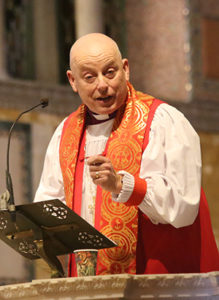
Bishop John Harvey Taylor preaches at the April 16 Renewal of Vows service at St. John’s Cathedral. Photo / Janet Kawamoto
In Matthew’s Resurrection account, the risen Christ wants his followers to go back to Galilee, where it had all started. “There they will see me,” he says. In essence, this is his message: “Get out of this dangerous capital city. Go back to your families and fishing nets, the lives you led before we began our walk along the Way. Go home. That’s where our work together will continue.”
During his public ministry, Jesus preached that to follow him, people would have to leave their families and homes behind. As it turns out, that was just for a time of internship. Think of it as three ministry study years with the Messiah. His first post-Resurrection instruction was to send them back home, transformed into prophets and apostles of loving neighbor as self.
To appreciate fully the family reunion Jesus prepared in Galilee, it’s helpful to remember how home is at the heart of our civic as well as religious lives. Boston’s Tip O’Neill, a legendary speaker of the House of Representatives, liked to say that all politics was local. When you think about it, all voters are well-informed, because everyone is an expert about the lives they’re leading. Voting is our way of letting leaders know how we think they’re doing for us. Some politicians’ attempts to limit or restrict voting are among our greatest civic sins.
People’s votes are rooted in their local experiences — whether their streets are safe and clean, the schools decent, the police just, and the prices at the supermarket and gas station fair. My first instinct will probably be to vote what’s best for me and my family. By the grace of God and in the name of Christ, my better instinct will be to vote as though it’s vital that everyone enjoy the benefits and blessings of home that I do.
The elusiveness of home for so many of our siblings — the absence of the basic right of a place to lay their heads — has preoccupied the members of our Task Force on Housing Justice during its first year of work. From the unhoused (a better word, we learned at this month’s meeting, than homeless) to those who can’t afford to stay in our region after they retire and have to move away from family and friends, the high cost of housing in southern California affects everyone.
So let us collaborate with the risen Christ locally — in all our urban, suburban, coastal, mountain, rural, and desert Galilees. How can we organize Episcopalians to advocate before city councils, boards of supervisors, and planning commissions in our diocese’s six counties for affordable, low-cost, seniors’, and permanent supportive housing? How can our institutions leverage their real estate to provide housing on our campuses?
Housing justice is just one local issue. The comfort, safety, and peace of home — at its best, our truest experience of paradise — is the archetype for a just society, the beloved community, the kingdom of God itself. That’s why, if we are faithful, if we are in Christ, none of our homes is fully whole, safe, and secure unless everyone’s is, from Honduras to Huntington Park, from the brave veteran’s home next door to the home across the street of a brave trans volunteer banned from service by a cruel government. May the warming light of the empty tomb continue to encourage us to look around our neighborhoods for Jesus and, with him fully alive in our Easter hearts, do whatever can be done for the glory of God.
